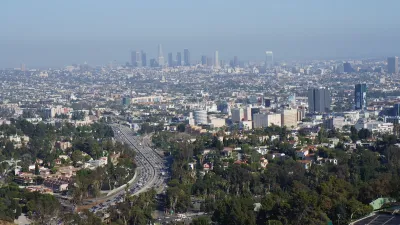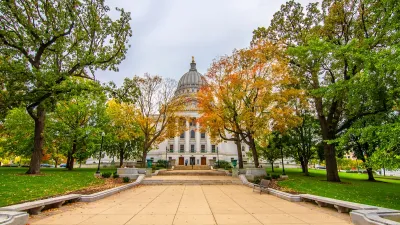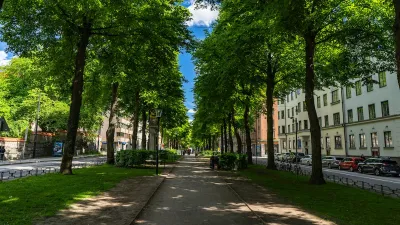After a vandal destroyed dozens of downtown LA trees, Mayor Karen Bass vowed to replace them. Days later, she slashed the city’s tree budget.

Last Saturday morning, Angelenos discovered dozens of downtown Los Angeles trees had been cut down overnight.
But, Alissa Walker points out in a piece in Torched, that’s not the only reason the city’s tree canopy is in danger. Urban forestry in Los Angeles faces deep cuts — and not just from a chainsaw-wielding vandal. Despite promising to “quickly replace” the damaged trees, Mayor Karen Bass released a 2025 budget that includes deep cuts to tree funding. In fact, “In its attempt to close a $1 billion deficit, the mayor's budget is bleak, recommending the layoffs of 1,647 workers and the closure of entire departments.”
Tighter budgets mean not only fewer trees planted but also fewer resources devoted to the maintenance and care of trees and surrounding sidewalks. “In 2021, the average number of days it took for city workers to address a tree emergency was 1. For the 2025 budget it's projected to take 4.” After similar cuts in 2008, sidewalks became so damaged that the city almost cut down 12,000 trees in an attempt to mitigate the problem. Using personal anecdotes, Walker outlines the many trees she has seen die out on L.A.’s streets.
Walker notes that “Particularly after the January fires, these decisions are irresponsible, if not downright reckless. On the heels of the worst climate disaster in LA history, the city plans to zero-out one of its best tools to mitigate extreme heat.”
FULL STORY: Tree emergency

Maui's Vacation Rental Debate Turns Ugly
Verbal attacks, misinformation campaigns and fistfights plague a high-stakes debate to convert thousands of vacation rentals into long-term housing.

Planetizen Federal Action Tracker
A weekly monitor of how Trump’s orders and actions are impacting planners and planning in America.

In Urban Planning, AI Prompting Could be the New Design Thinking
Creativity has long been key to great urban design. What if we see AI as our new creative partner?

King County Supportive Housing Program Offers Hope for Unhoused Residents
The county is taking a ‘Housing First’ approach that prioritizes getting people into housing, then offering wraparound supportive services.

Researchers Use AI to Get Clearer Picture of US Housing
Analysts are using artificial intelligence to supercharge their research by allowing them to comb through data faster. Though these AI tools can be error prone, they save time and housing researchers are optimistic about the future.

Making Shared Micromobility More Inclusive
Cities and shared mobility system operators can do more to include people with disabilities in planning and operations, per a new report.
Urban Design for Planners 1: Software Tools
This six-course series explores essential urban design concepts using open source software and equips planners with the tools they need to participate fully in the urban design process.
Planning for Universal Design
Learn the tools for implementing Universal Design in planning regulations.
planning NEXT
Appalachian Highlands Housing Partners
Mpact (founded as Rail~Volution)
City of Camden Redevelopment Agency
City of Astoria
City of Portland
City of Laramie





























